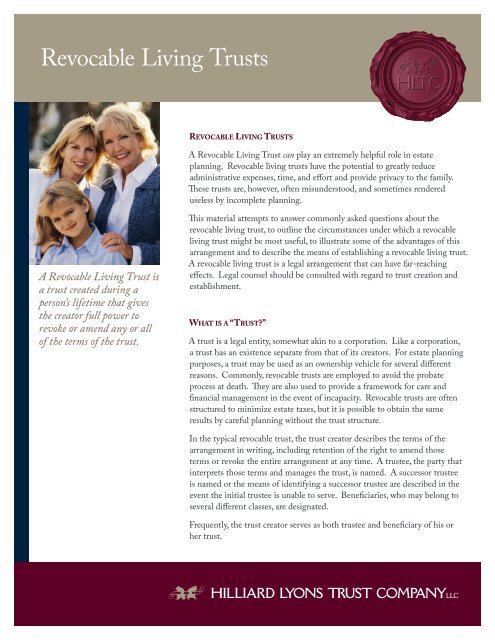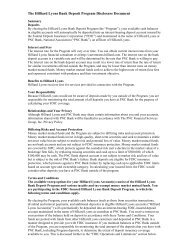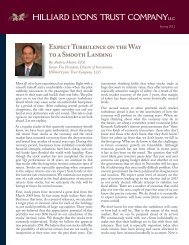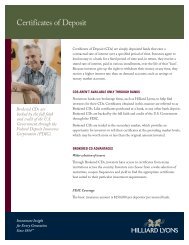Revocable Living Trusts - Hilliard Lyons
Revocable Living Trusts - Hilliard Lyons
Revocable Living Trusts - Hilliard Lyons
Create successful ePaper yourself
Turn your PDF publications into a flip-book with our unique Google optimized e-Paper software.
<strong>Revocable</strong> <strong>Living</strong> <strong>Trusts</strong><strong>Revocable</strong> <strong>Living</strong> <strong>Trusts</strong>A <strong>Revocable</strong> <strong>Living</strong> Trust can play an extremely helpful role in estateplanning. <strong>Revocable</strong> living trusts have the potential to greatly reduceadministrative expenses, time, and effort and provide privacy to the family.These trusts are, however, often misunderstood, and sometimes rendereduseless by incomplete planning.A <strong>Revocable</strong> <strong>Living</strong> Trust isa trust created during aperson’s lifetime that givesthe creator full power torevoke or amend any or allof the terms of the trust.This material attempts to answer commonly asked questions about therevocable living trust, to outline the circumstances under which a revocableliving trust might be most useful, to illustrate some of the advantages of thisarrangement and to describe the means of establishing a revocable living trust.A revocable living trust is a legal arrangement that can have far-reachingeffects. Legal counsel should be consulted with regard to trust creation andestablishment.What is a “Trust?”A trust is a legal entity, somewhat akin to a corporation. Like a corporation,a trust has an existence separate from that of its creators. For estate planningpurposes, a trust may be used as an ownership vehicle for several differentreasons. Commonly, revocable trusts are employed to avoid the probateprocess at death. They are also used to provide a framework for care andfinancial management in the event of incapacity. <strong>Revocable</strong> trusts are oftenstructured to minimize estate taxes, but it is possible to obtain the sameresults by careful planning without the trust structure.In the typical revocable trust, the trust creator describes the terms of thearrangement in writing, including retention of the right to amend thoseterms or revoke the entire arrangement at any time. A trustee, the party thatinterprets those terms and manages the trust, is named. A successor trusteeis named or the means of identifying a successor trustee are described in theevent the initial trustee is unable to serve. Beneficiaries, who may belong toseveral different classes, are designated.Frequently, the trust creator serves as both trustee and beneficiary of his orher trust.
<strong>Revocable</strong> <strong>Living</strong> <strong>Trusts</strong>What are some common uses of a <strong>Revocable</strong><strong>Living</strong> Trust?<strong>Revocable</strong> living trusts are employed to:A. Secure asset management and protection for thetrust creator and the family of the trust creator inthe event of the trust creator’s incapacity.B. Avoid the probate process at the death of the trustcreator.C. Secure estate and inheritance tax savings.D. Protect assets for the benefit of family membersafter the death of the trust creator.Who may serve as the Trustee?Under most revocable trust circumstances, the personcreating the trust can act as trustee. It is possible tocreate a revocable trust and name another person toserve as trustee, or name more than one party to serveas co-trustees. Some corporations (banks and trustcompanies) are licensed to offer professional trusteeservices. The trust’s terms should designate anothertrustee to serve as backup or successor trustee in theevent the named trustee is unable to serve, or providea mechanism to determine a successor trustee.What is “probate” and why should it beavoided?Probate is a formal, court-supervised procedureestablished by each state to protect the rights ofcitizens to transfer property at death. Probate ensuresthat the creditors of a deceased person have a venuefor recovering their claims. Each state has establishedits own separate probate procedure. The universalproblem with the procedure is that it is cumbersome,time consuming, expensive, and public. Legal counselis usually required. Probate proceedings are publicdomain, and probated wills become a matter of publicrecord. Anyone can read a probated will merely byvisiting the courthouse. A listing of the assets ofthe deceased is added to the probate file. Familyassets (and their values) become public knowledge(in some jurisdictions, the inventories of estates areeven published in local newspapers). State lawsestablish mandatory minimum time periods for estateadministration, regardless of the size of the estate.It is the court’s responsibility to ascertain the validityof the decedent’s will, appoint a party to representthe estate (an executor or personal representative),and to make sure that the decedent’s taxes and debtsare paid. The court also sees that the decedent’sproperty is distributed according to the terms of thedecedent’s will or, if there is no will, in accord with adistribution scheme devised by the state legislature ofthe deceased’s state of residence.Ownership of real estate in different states createsa probate headache. A separate probate proceedingis required in every state in which a deceased personowned real estate.What is the cost of probate?Probate expenses vary from jurisdiction to jurisdiction.Some studies place them as high as 10% of theestate’s gross value. Costs will vary depending oncomplexity of estate plan, assets owned by thedecedent and location. The actual court filing feesfor estate administration are only a small part of thetotal cost. Professional fees, such as the cost of legalrepresentation and the executor’s fee usually constitutea major portion of the total expense and should beincluded in all projections of probate fees.Even if a court supervised probate is avoided, someduties of estate administration may be required.
<strong>Revocable</strong> <strong>Living</strong> <strong>Trusts</strong>Death tax returns must be filed by the trustee. Incometaxes for the decedent for the year of death must befiled and assets transferred.Do trusts avoid probate? How?Assets held in the name of a deceased person mustpass through the probate process. Correctly structured,assets held in a revocable living trust are not owned bythe decedent; they are owned by his or her trust. Thetrust does not “die” when its creator does. A successortrustee may have taken over, but the trust itself isstill a viable entity. Wills do not avoid probate at all.Testamentary trusts, since they are created under theterms of a will, actually have no effect until they areprobated. Assets owned by a revocable trust should notbe subject to the jurisdiction of the probate court.What happens to my will if I create arevocable trust?Your existing will does not cover assets placed into acorrectly designed trust. To completely coordinateyour estate plan, when a trust is created, a new will (ora codicil amending an existing will) is usually prepared.A will prepared in conjunction with a revocable trust isknown as a “pour-over” will. This type of will providesthat anything you own outside the trust will pass tothe trust when the probate process has been completed,and will thereafter be controlled by the terms of thetrust.How can a <strong>Revocable</strong> <strong>Living</strong> Trust help in theevent of incapacity?The trustee of a revocable living trust may be givendetailed authority to manage the assets of the trust, paymedical bills, file insurance claims, and pay day-to-dayexpenses of the beneficiary. In the typical revocableliving trust situation, the trust creator serves as theinitial trustee. If he or she becomes unable to handlebusiness affairs, the successor trustee named in thetrust may take over without involvement of the localdisability court, and use the trust assets to care of thetrust’s creator. The terms of the trust can specify how“care” is to be defined, giving the trust creator indirectcontrol of his or her treatment upon disability.How can a <strong>Revocable</strong> <strong>Living</strong> Trust saveestate taxes?For married couples, a carefully structured trust canprovide that both of their estate tax exemptions willbe fully employed. As of January 1, 2015, $10,860,000of the assets of a married couple may pass tax freeto their beneficiaries. For single persons with largeestates, revocable living trusts can provide estate taxminimization measures which allow the grantor’sannual gift tax exclusion to be fully utilized, even if thegrantor becomes incompetent.Some of the same savings can be realized with wills,but wills do not have the added advantage of avoidingprobate.
<strong>Revocable</strong> <strong>Living</strong> <strong>Trusts</strong>How can a <strong>Revocable</strong> <strong>Living</strong> Trust protectmy family?The privacy enjoyed by a revocable living trust protectssurvivors. Nosy neighbors, ex-spouses and formerin-laws are not able to read the terms of a trust ordetermine its assets.<strong>Revocable</strong> living trusts may provide that after thedeath of the trust creator, the trust should continuefor the benefit of a spouse and/or children, regardlessof the ages of the children. Income and principal maybe applied for their benefit long after the death ofthe trust creator. Under certain conditions, a trust ofthis type cannot be broken, it cannot be invaded if aspouse remarries and the new spouse desires access totrust funds, it cannot be invaded by children’s spouses,creditors of a spouse, or children, or in a divorce action.The trust may even be drafted in a manner that willhelp your children minimize or avoid estate taxes attheir deaths!How does the trust become effective?After you and your attorney prepare and execute arevocable living trust, it must be funded by titlingassets in the trust’s name. It is not necessary that thenames on all assets be changed, but any asset held inyour sole name, without a contractually designatedbeneficiary (such as an IRA or life insurance policy),will require probate at your death.What are the income tax consequences of a<strong>Revocable</strong> <strong>Living</strong> Trust?If the trust creator serves as his or her own trustee, thetrust simply uses the creator’s social security numberfor tax purposes. No special forms are required to befiled.How much does it cost to set up a <strong>Revocable</strong><strong>Living</strong> Trust?Costs of establishing a revocable living trust dependupon the complexity of your estate plan and the extentof your estate. Fees also vary from attorney to attorney.In an effort to minimize the costs of creating trusts toour clients, the estate planning specialists at <strong>Hilliard</strong><strong>Lyons</strong> Trust Company are happy to offer financialadvice and general estate planning suggestions to ourclients, but we are unable to prepare trusts and wills,or offer legal advice. This must be done by your legalcounsel.For more information about our services, call us at(502) 588-8400, (888) 878-7845, or email us atTrustInfo@hilliard.com.How do I fund my trust?A trust is funded by making the name changes referredto above. Your <strong>Hilliard</strong> <strong>Lyons</strong> Financial Consultantwill help you re-title your securities, regardless ofwhere you acquired them. Your banker will help youre-title your cash accounts, and your attorney will helpyou re-title real estate.J.J.B. <strong>Hilliard</strong>, W.L. <strong>Lyons</strong>, LLC (<strong>Hilliard</strong> <strong>Lyons</strong>) and <strong>Hilliard</strong> <strong>Lyons</strong> Trust Company, LLC are affiliated companies. Securities offered by <strong>Hilliard</strong> <strong>Lyons</strong>.Neither <strong>Hilliard</strong> <strong>Lyons</strong> nor <strong>Hilliard</strong> <strong>Lyons</strong> Trust Company provide individualized tax, accounting or legal advice. This piece is intended for general educationalpurposes only. Please consult your accountant or attorney for personal tax, accounting or legal advice. © 2015 J.J.B. <strong>Hilliard</strong>, W.L. <strong>Lyons</strong>, LLC.






